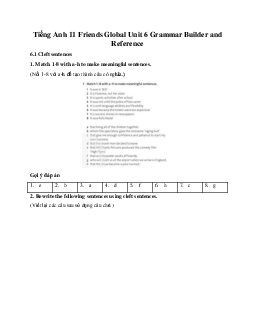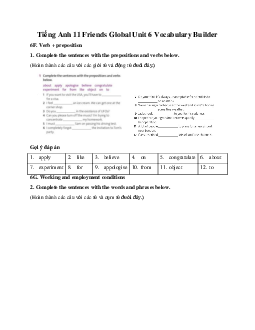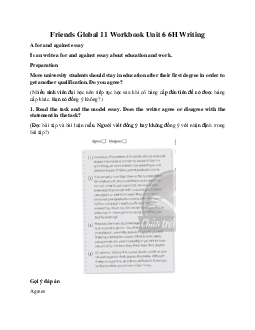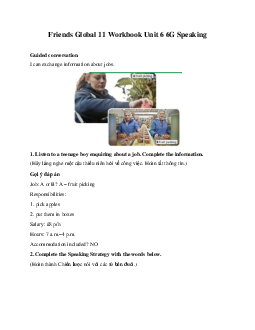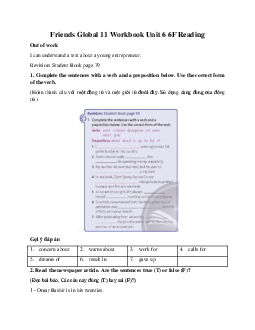





Preview text:
Tiếng Anh 11 Friends Global Unit 6 6E Word Skills
1. Read the article. What is the problem Boyan Slat is trying to solve? What is his solution?
(Đọc bài viết. Vấn đề Boyan Slat đang cố gắng giải quyết là gì? Giải pháp của anh ấy là gì?) Gợi ý đáp án
- The problem that Boyan Slat is trying to solve is the issue of plastic pollution in the
oceans, which kills millions of sea creatures every year.
- His solution is an invention that would float on the surface of the ocean and gradually
clean it by collecting around 20 billion tonnes of plastic, which could then be recycled
and sold for about $500 million a year.
2. Circle the correct words to complete the Learn this! box. Use the examples in the
box and the article to help you.
(Khoanh tròn những từ đúng để hoàn thành bài tập khung Learn this! Sử dụng các ví dụ
trong hộp và bài viết để giúp bạn.) Gợi ý đáp án 1. before 2. after 3. inseparable
3. Find the phrasal verbs in the article. Are they separable or inseparable? How do you know?
(Tìm các cụm động từ trong bài viết. Chúng có thể tách rời hay không thể tách rời? Làm sao bạn biết?) Gợi ý đáp án
Các cụm động từ trong bài: - come up with: đưa ra - end up in: kết thúc - break up: chia nhỏ - clean up: dọn dẹp - throw away: ném đi - run ot of: cạn kiệt - work out: thực hiện
Các cụm động từ không thể tách rời: come up with, end up in, run out of
=> tân ngữ đứng sau tiểu từ và chủ yếu là cụm động từ có ba phần
Các cụm động từ có thể tách rời: throw away, break up, clean up, work out
=> tân ngữ có thể đứng trước hoặc sau tiểu từ
4. DICTIONARY WORK Read the dictionary entries. Then answer the questions below.
(Đọc các mục từ điển. Sau đó trả lời các câu hỏi dưới đây.) Gợi ý đáp án
1. two-part: look after sb/ st/ yourself, look st up
three-part: look down on sb/ st, look up to sb 2. Separable: look st up
Inseparable: look after sb/ st/ yourself, look down on sb/ st, look up to sb
You know whether the verbs are separable or inseparable because of the position of the object (sb/ st)
5. VOCABULARY Match the phrasal verbs below with definitions 1-9. Is each
phrasal verb separable or inseparable?
(Nối các cụm động từ dưới đây với các định nghĩa từ 1-9. Mỗi cụm động từ có thể tách
rời hay không thể tách rời?) Gợi ý đáp án 2. bring st up (separable)
3. take after sb (inseparable) 4. count on sb (inseparable) 5. hold sb up (separable) 6. ask sb out (separable)
7. come across st (inseparable) 8. turn into st (inseparable) 9. call st off (separable)
6. Complete each question using a phrasal verb from exercise 4 or 5. Complete the
follow-up question with the same phrasal verb and the correct pronoun.
(Hoàn thành mỗi câu hỏi bằng cách sử dụng một cụm động từ từ bài tập 4 hoặc 5. Hoàn
thành câu hỏi tiếp theo với cùng một cụm động từ và đại từ đúng.) Gợi ý đáp án 1. look up; look up to them 2. give up; give it up 3. ask out; ask her/ him out
4. come across, come across it
5. take after; take after them/ her/ him
7. SPEAKING Work in pairs. Ask and answer the questions and follow-up
questions from exercise 6.
(Làm việc theo cặp. Hỏi và trả lời các câu hỏi và câu hỏi tiếp theo từ bài tập 6.) Gợi ý đáp án
1. A: Which person from history do you look up to
B: I look up to Mahatma Gandhi because he fought for India's independence through non-violence. A: Why do you look up to him?
B: I admire his leadership and his commitment to justice and peace.
2. A: Which food or habit would you like to give up?
B: I would like to give up eating junk food.
A: Why do you want to give it up?
B: I want to have a healthier diet and avoid health problems in the future.
3. A: If you could take after a famous person, who would you choose?
B: I would like to take after Elon Musk because of his vision and innovation.
A: Why would you want to take after him?
B: I think he has achieved a lot in his career and is always pushing the boundaries of what's possible.
4. A: Have you ever come across some money in the street? If so, what did you do when you picked it up?
B: Yes, I found some money on the sidewalk once. I picked it up and looked around to
see if anyone had dropped it, but no one was around. So I kept it and donated it to a local charity. A: Why did you donate it?
B: I didn't feel right keeping something that wasn't mine, and I wanted to do something good with it.
5. A: Which member of your family do you care after?
B: I care after my younger sister.
A: In what way do you care after her?
B: Well, I help her with her homework, drive her to and from school, and make sure she eats healthy meals.
